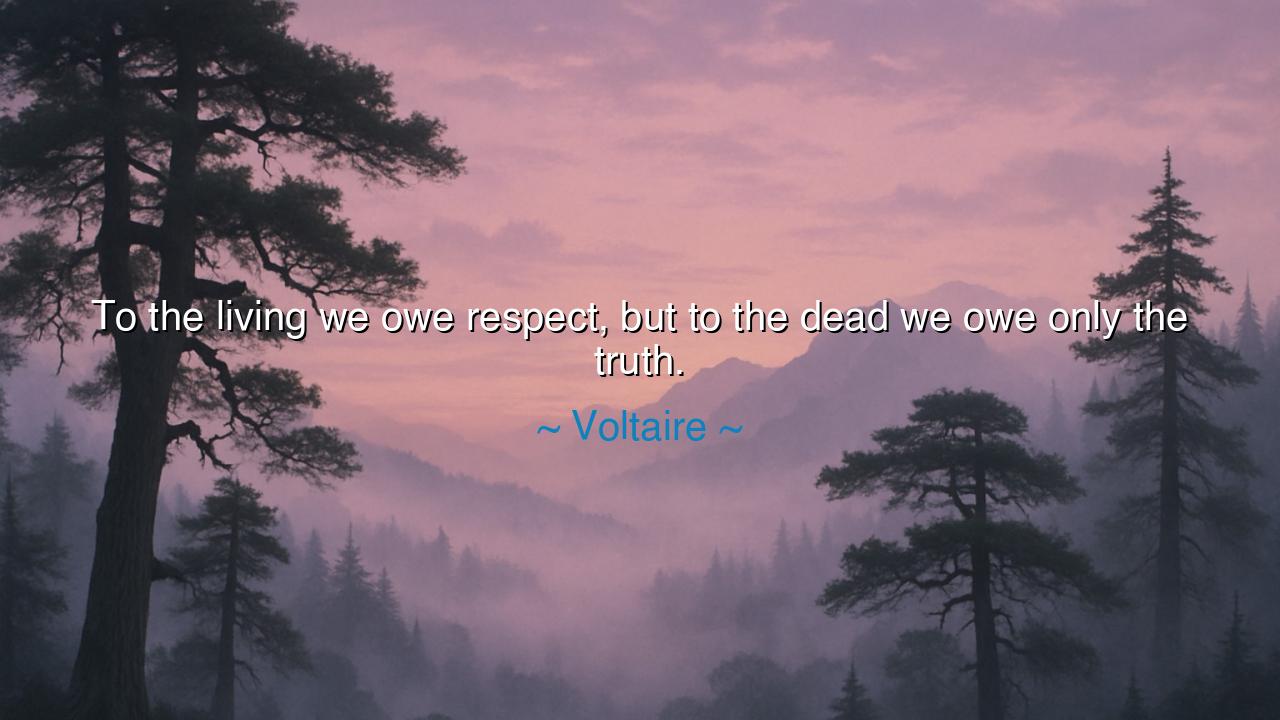
To the living we owe respect, but to the dead we owe only the






The words of Voltaire — "To the living we owe respect, but to the dead we owe only the truth." — pierce with the sharpness of reason and the weight of justice. In them, we hear both compassion and courage. For the living, fragile and tender, must be treated with respect, that they may walk in dignity and hope. But the dead, beyond harm and beyond comfort, require no flattery, no falsehood, no veil of lies. What we owe them is truth — the clear and unclouded telling of who they were, what they did, and what legacy they left behind. In this way, Voltaire, the great philosopher of the Enlightenment, reminds us of the double duty of humanity: mercy to those who still walk among us, and honesty toward those who have passed beyond our reach.
The origin of this teaching lies in Voltaire’s lifelong struggle against hypocrisy and falsehood. In his time, kings were praised beyond their worth, and powerful men were idolized in death while their injustices were hidden. Voltaire refused such corruption of memory. He knew that to falsely glorify the dead was to deceive the living, to poison history, and to repeat error. By giving the truth to the past, we give wisdom to the future. To respect the living is kindness; to speak the truth about the dead is justice.
History itself shows the power of this principle. Consider Winston Churchill, revered as the voice that rallied Britain through its darkest hours. To the living, his people gave him respect, for he inspired them to endure when hope seemed lost. But after his death, the duty of historians was not merely to praise him, but to tell the whole truth: his brilliance in war, yes, but also his flaws, his misjudgments, his controversial views. To give only admiration would have been false; to give only condemnation would have been unjust. By telling the truth, posterity honors him in full — both his greatness and his humanity.
We see also the tragedy when this principle is ignored. The cults of tyrants such as Stalin or Mao demanded that not only in life but in death they be worshiped, their errors hidden, their crimes denied. To grant them false reverence was to chain generations to lies. Only when truth pierced through the veil of propaganda could their people begin to heal. For it is the truth about the dead that frees the living from repeating their mistakes.
The teaching is therefore both gentle and stern: to the living, offer respect, for their journey is not yet finished, and kindness strengthens them. But to the dead, offer truth, for they can neither be harmed nor flattered, and the accuracy of their story becomes the inheritance of future generations. Respect nurtures life; truth preserves history. Without respect, the living wither. Without truth, the dead become idols or phantoms, and the living stumble in ignorance.
The lesson is clear: be generous to those around you, showing respect in your words and actions, even when you disagree, for they still have paths to walk and burdens to carry. But when speaking of those who have passed, practice honesty. Do not exaggerate their virtues, nor conceal their failings. For your duty to them is not comfort but clarity. By this balance, you show compassion to the present and integrity to the past.
What then should you do in practice? Respect the living with patience, empathy, and kindness, for every soul is still in the making. Speak truth of the dead in your families, in your histories, and in your remembrance, so that the lessons of their lives may instruct and not mislead. Teach your children not only to honor their ancestors, but to understand them as they truly were — noble in some ways, flawed in others, human in all. In this way, you weave both mercy and wisdom into the fabric of your community.
Thus let this teaching endure: to walk rightly in life is to balance respect and truth. Let the living be strengthened by your honor, and let the dead be remembered with honesty. For mercy without truth leads to delusion, and truth without mercy leads to cruelty. But when both are given in their rightful measure, the dignity of man and the wisdom of history are preserved for all generations.






AAdministratorAdministrator
Welcome, honored guests. Please leave a comment, we will respond soon